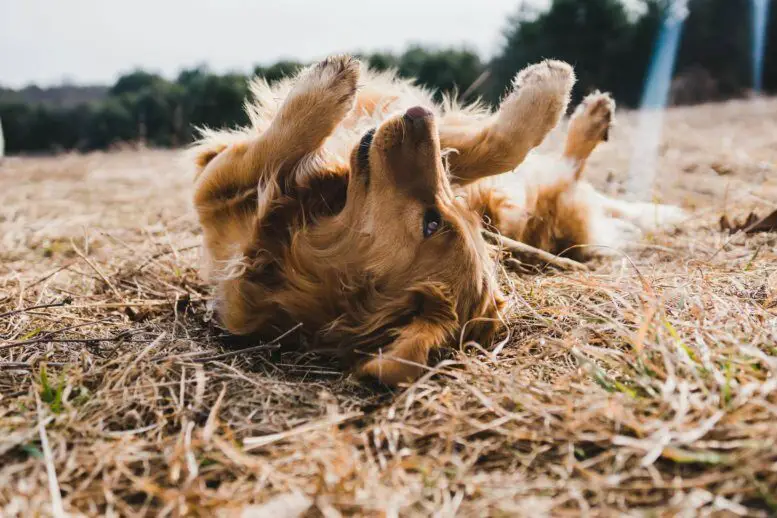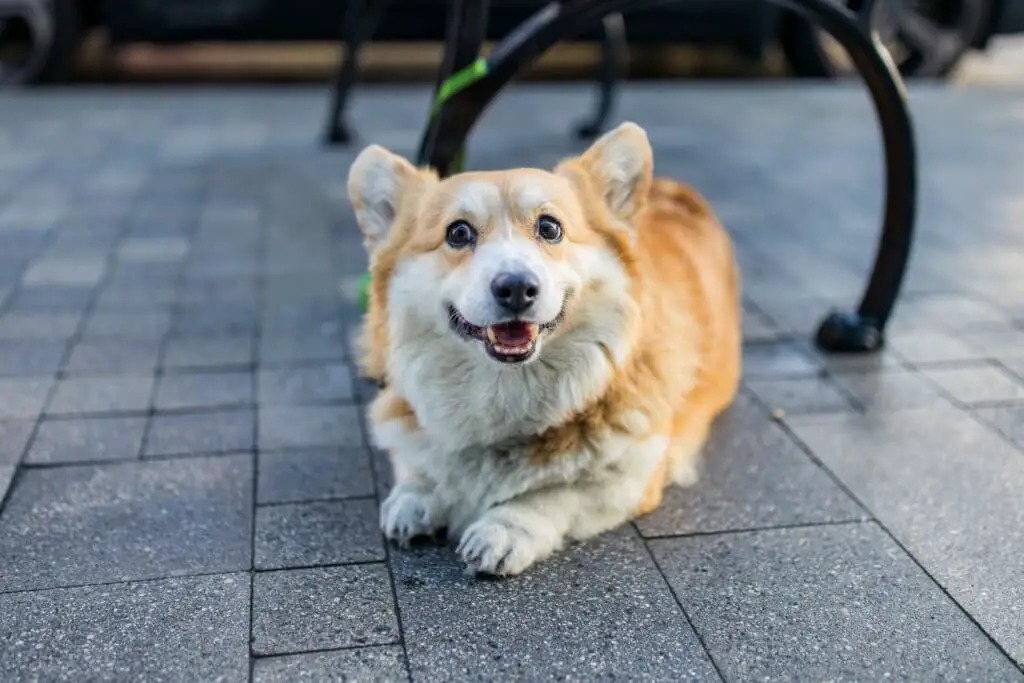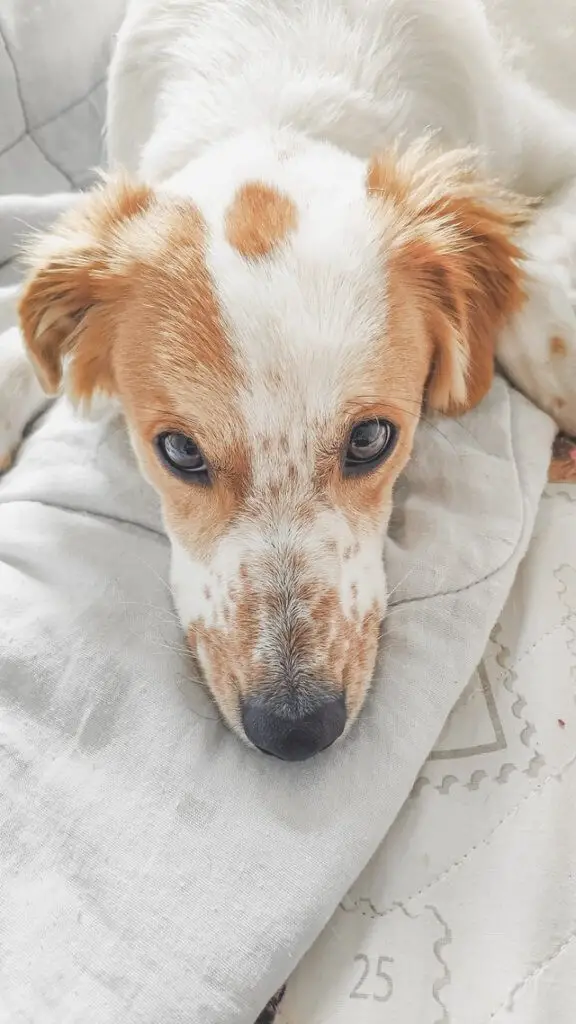What is the real reason why do dogs roll in dead animals? Can you do anything to prevent it? And how to get rid of dog smell afterward?
You know how it goes. You have washed your dog, made him pristinely clean. Then, you go for a walk, and take your eyes off your friend for just a few seconds… Just to see your dog rolling in poop, or even worse, in nearby roadkill!
Our canine companions love rolling in stinky things. It seems like they especially love getting dirty in situations where that will embarrass us. Not only does this look disgusting and unhygienic, but your dog will end up having that terrible animal carcass odor.
We may think dogs do this to upset us, or because they love attention, even if it’s negative.
A Few Theories on Why Do Dogs Roll In Dead Animals

Believe it or not, even the biggest pet experts aren’t sure why do dogs roll in dead animals. However, there are a few theories so we will go over them…
Smelliness Improves Stealth
One of the commonly suggested reasons why do dogs roll in dead animals is their genetics. Before they were domesticated and brought inside our homes, dogs used to be hunters, wild predators.
Their distant relatives, wolves, roll in animal carcasses to hide their scent.
Many biologists have thus concluded that this dog behavior is a result of their instincts. Once a dog has hidden its predator scent, it can sneak up on prey more effectively.
When you think about it, this does make sense. If a deer smelled a wolf nearby, it would run away, looking for safety. At least, it would be aware of the danger and remain on the lookout.
The smell of dead things, on the other side, is rather typical in the wilderness. It is strong enough to mask different scents, which makes it perfect for camouflage.
The problem with this theory, however, is that most prey animals rely on their sight. They have good peripheral vision, and they will commonly see a predator before they sense it.
If their sense of smell is strong enough to smell danger, they will feel it through the carcass scent.
Not only that, but wolves, in particular, tend to chase their prey rather than being stealthy. All of this makes many people doubt this is the real reason why do dogs roll in dead animals.
Sharing Information
Another theory suggests that dogs roll in smelly things to help share information. This can go two ways.
Half of the scientists believe that dogs roll in dead animal bodies to share their pack smells.
For example, wolves tend to carry a scent of caught prey to their pack-mates on their bodies.
Other wolves will then follow this scent and find the source of food. In the wilderness, where food is lacking, finding it is of utmost importance.
Other, smaller part of scientists believes that the dog is actually trying to cover the dead animal smell with its own.
They do this to mark their territory. This theory isn’t too plausible, though, as there are much more efficient ways for dogs to do this.
Why would a dog roll in the carcass to mark his territory if he can mark it with feces or urine?
Many people find this hard to believe.
For Fun
Even if some of the already mentioned theories are true, one thing can’t be denied. Dogs love doing this activity that brings their owners on the verge of anger.
Scientists believe that rolling in dead animals increases dopamine levels in dogs. Dopamine is a neurotransmitter that brings the feeling of reward and pleasure. In other words, dogs simply enjoy getting smelly!
No matter how this activity originated, domestic dogs do not need to do it, other than to have fun. And if you look at your dog while he’s doing this, you’ll see signs of happiness.
Snorting and hanging tongs are a clear sign your companion is enjoying. You, the owner, probably not so much.
Can You Prevent It?

Even if this is fun for your canine, having a dog rolling in poop or carcass shouldn’t be allowed. Not only will you be forced to clean and wash your smelly dog, but you never know if it’s safe.
Most dead animals don’t have any harmful bacteria on them, but you can’t be sure why the animal died.
This is why you should always keep your pet on a leash during walks. If the dog does get off the leash, then some training is a must. Here are some ways you can prevent your canine from rolling in stinky stuff.
- Learn Your Dog Name Recognition
It would be best to teach your companion to come back to you when you say his name. This is important in many situations, some of which are more dangerous than your dog getting a bit dirty.
Training should start in familiar areas, where there aren’t many distractions. Make sure your dog is on the leash, then say his name.
If he turns towards you, use a clicker or praise him and award him with a treat. On the other hand, if he doesn’t look at you, don’t get angry. Call him a few more times in a playful tone, then gently tap him on the rear.
This will catch his attention. Praise him when he turns around and try again. Often, dogs won’t look at you as something is distracting them.
Try to notice if this is the case, then remove the distraction. Reward him every time he acts as you want him to.
After a while, your dog should happily turn to you every time he hears his name. Most will even happily run towards you. With little luck, this will distract him long enough to forget the messy activity he planned to do.
- Teach Him a Recall
The dog must know that he has to come to you when called. If you plan to keep your dog off-leash, this is the most important thing you need to do. A dog who knows when to come to you is safe.
This also comes in handy with this problem. Did you notice your dog walking nearby a smelly dead animal? Call him to get back before the situation escalates, and you end up with a dirty, stinky dog.
- Anticipate Problem Areas
If you know that there is roadkill down the street, don’t walk with your dog there. When you don’t have a choice but to walk past it, keep him on a leash.
Don’t allow your pup to pull you towards something that he shouldn’t touch. Make sure your dog pays attention to you. Praise him and give him treats if necessary. Make him think that he’ll have more fun with you compared to rolling in a nasty carcass.
How to Get Rid Of Dog Smell?

If none of the methods above worked and your dog rolled in something dead, there’s only one thing left to do. You have to know how to get rid of dog smell afterward.
In the end, this information is more useful than understanding why do dogs roll in dead animals. Here are a few ways you can make your dog clean again.
Brush Him
Brushing a dirty dog is an excellent way to eliminate any clumps that have gotten onto his fur. Just make sure you have the right brush for his coat! Also, it’s better if you do this outside.
Shampoo
Take a good dog-friendly shampoo and make it sit in your pup’s fur for a while. Don’t use any fragrances, as this will make the dog uncomfortable.
Rinse 

You have to make sure you have rinsed your dog well. You’ll know he’s ‘squeaky clean’ when you hear squeaking after petting his wet coat.
And if you dog hair get glued and nasty, and you cant brush it, only solution is to use dog scissors to cut hair on that area.
Alternative Methods
Sometimes, dog shampoo is simply not enough to effectively get rid of the smell. Below are some things that could be used instead. Just remember, most of these things shouldn’t get into your dog’s eyes, ears, and nose!
- Hydrogen peroxide mix– combine hydrogen peroxide, liquid dish soap, and baking soda. Keep in mind that this mix can burn sensitive tissues!
- Citrus– Orange peel is great to get rid of grease when your dog rolls in poop.
- Ketchup– Great for skunk stench!
Bottom Line
In the end, no one really knows why do dogs roll in dead animals or feces. No matter the reason, they are having fun. This, however, doesn’t mean that they should be allowed to do so.
Rolling in a carcass or poop will make your dog dirty and smelly. It may even endanger his health, as poop can carry parasites, and you aren’t sure why that dead animal died.
This is why you should learn to prevent your dog from doing this. Training is the key! And if the dog does get smelly, you have to know how to get rid of dog smell.